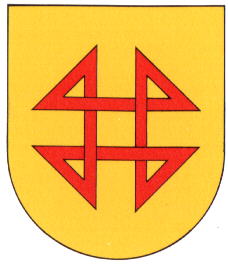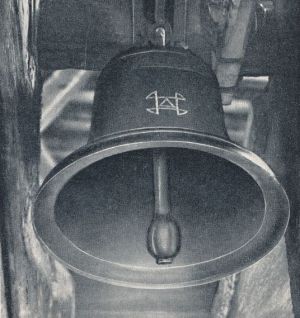Hausgereut: Difference between revisions
Knorrepoes (talk | contribs) m (Text replacement - "{{de}}" to "") |
Knorrepoes (talk | contribs) m (Text replacement - "|'''English''' ↵| {{blazon wanted}}" to "|'''English''' | blazon wanted") |
||
| Line 16: | Line 16: | ||
|- | |- | ||
|'''English''' | |'''English''' | ||
| | | blazon wanted | ||
|} | |} | ||
Revision as of 09:38, 7 April 2023
HAUSGEREUT
State : Baden-Württemberg
District (Kreis) : Ortenaukreis (until 1973 Kehl)
Incorporated into : 1973 Rheinbischofsheim (1975 Rheinau)
| German | In Gold eine rote Marke in Gestalt von je zwei an den Enden mit je zwei Balkenleisten dreiecksweise verbundenen Pfahlleisten. |
| English | blazon wanted |
Origin/meaning
The arms were officially granted on June 20, 1961.
Hausgereut became an independent municipality only in 1844 and thus had no historical seals or arms. The village had a village symbol, which was used on borderstones and can also be found on the bell in the local church, made in 1749, see image below.
The new municipality thus adopted this sign on its seal. But in 1895 the municipality adopted arms, showing a black eagle in a silver field, with a small red inescutcheon with a black letter H. These arms were never officially granted. The eagle was (wrongly) seen as the arms of the County Hanau-Lichtenberg, to which the area historically belonged. The inescutcheon showed the town's initial.
After the Second World War the village again adopted the village symbol on its seal and arms. It took, however, until 1961 before the arms were officially granted in the colours of Baden.
Most village symbols in Baden were composed of geometrical patterns, without any specific meaning, except to be distinct from those of neighbouring villages. The meaning thus is not known, although the municipality in 1961 explained the symbol as a kind of map of the village streets, with the triangles symbolising houses.
Literature: Zier and Kastner, 1961

